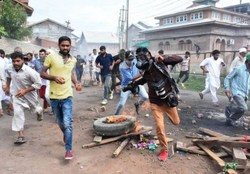 Residents in Indian-administered Kashmir are resisting attempts by authorities to show some signs of normalcy returning to the Muslim-majority valley, a month after New Delhi government scrapped disputed Himalayan region’s autonomy.
Residents in Indian-administered Kashmir are resisting attempts by authorities to show some signs of normalcy returning to the Muslim-majority valley, a month after New Delhi government scrapped disputed Himalayan region’s autonomy. RNA - Many students are still boycotting classes, shopkeepers are not opening up and public and private sector employees are not turning up for work.
In posters across Kashmir's main city of Srinagar, shopkeepers have been asked to only open late in the evenings and early in the mornings to enable residents to buy essentials.
In the commercial areas of downtown Srinagar, the majority of shops remain shuttered and despite Indian forces asking owners to return to normal opening hours, many have refused.
"We were opening shops in the evenings for people," Mohammad Ayub, a Srinagar shopkeeper, told Reuters.
"For us, our identity at stake and its safeguarding is our priority," said Shabir Ahmad, a shopkeeper from the old quarter of Srinagar. "Let them restore it and we will re-start our businesses."
Rohit Kansal, the official spokesman of the Jammu and Kashmir state government, blamed "anti-national" forces for preventing shops from opening. "Security forces have taken note of it," he said.
Kansal said 4,000 schools in Kashmir were functioning, and that attendance was improving, although it remained low in some areas.
But local residents say many schools are empty. "How can I send my children to school? There is a clampdown and we are concerned for the safety of our wards," Javed Ahmad, a Srinagar parent, said.
The shutdown and restrictions are having an impact across all areas of society.
With tourists avoiding the region, hotel owners say occupancy rates are close to zero. Srinagar's historic Jamia Masjid mosque has been closed for a month.
Kashmir's postal service is heavily disrupted, and online retailers including Amazon, say their operations in the region remain suspended.
Pharmacists say there are shortages of some drugs because of logistical problems, particularly thyroid, diabetes, anti-depressant and cancer drugs.
A chemist in the Jawahar Nagar area of Srinagar turned back half a dozen customers asking for common drugs on Wednesday, saying he didn't have any left.
On Thursday, Aakar Patel, head of rights group Amnesty International India, launched a campaign, urging New Delhi to lift the communications blockade.
"It has grossly impacted the daily lives of Kashmiri people, their emotional and mental well-being, medical care, as well as their access to basic necessities and emergency services. It is tearing families apart," Patel said.
On August 5, Prime Minister Narendra Modi revoked special rights for Jammu and Kashmir state, striking down long-standing constitutional provisions for the Himalayan region
To dampen the possibility of widespread protests, India flooded Kashmir with troops, imposed severe restrictions on movements, and cut all telephone, mobile phone and internet connections.
Thousands of people were detained. Separatist leaders have been detained alongside mainstream politicians, including three former chief ministers and hundreds of other civil society leaders.
New Delhi has since eased some of the curbs, although no prominent detainees have been freed and mobile and internet connections remain suspended.
Officials say attendance in major government offices in Srinagar is about 50% and those in smaller, subordinate offices in the city is substantially lower.
At an office of the state housing and urban development department in western Srinagar, only 30 out of about 300 staff were in attendance on most days.
"Only those who live nearby report to the office. The others come in once in a while," media outlets quoted an official as saying.
Government workers employed to tend Srinagar's famous Dal Lake have not turned up for work in several weeks and the water's surface has become clogged with weeds.
According to Press TV, Kashmir has been split between India and Pakistan since their partition in 1947. Both countries claim all of Kashmir and have fought three wars over the territory.
In August 1947, the British Raj was dismantled with the subcontinent divided into two independent states, Hindu-majority India and Muslim-majority Pakistan.
Millions were uprooted in one of the largest mass migrations in history, with experts estimating at least one million died in communal violence unleashed by partition that continues to haunt the subcontinent to this day.
847/940